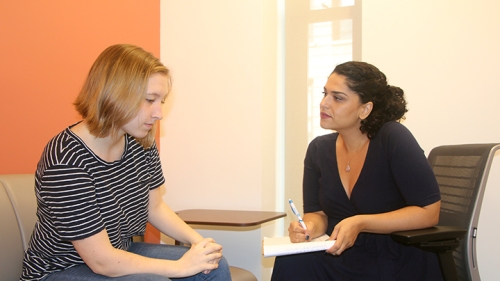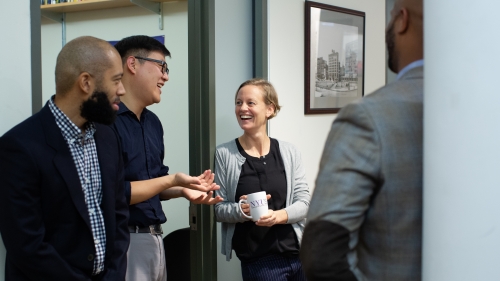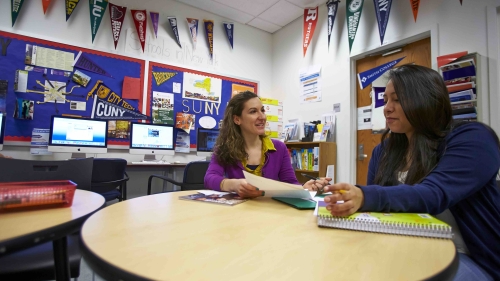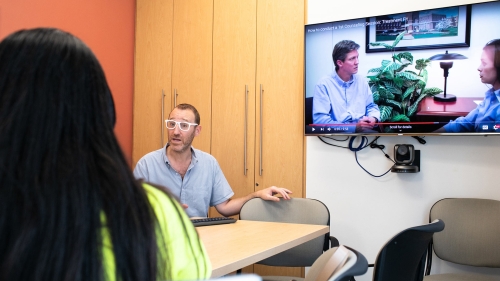
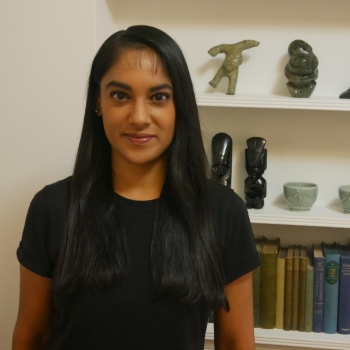
Alisha Ali is an Associate Professor in the Department of Applied Psychology at New York University. She heads the Advocacy & Community-Based Trauma Studies (ACTS) lab. Her research focuses on the mental health effects of violence, poverty and various forms of trauma. Dr. Ali's current projects are investigating empowerment-based and arts-based programs for military veterans, domestic violence survivors, and low-income high school students. She has presented her research to a range of international audiences, including the World Economic Forum and the United Nations Development Program. She is co-editor (with Dana Crowley Jack) of the book Silencing the Self Across Cultures: Depression and Gender in the Social World (Oxford University Press), co-editor (with Niobe Way, Carol Gilligan & Pedro Noguera) of the book The Crisis of Connection (NYU Press), and co-editor (with Bradley Lewis & Jazmine Russell) of the book The Mad Studies Reader (Routledge Press). Her work has been funded by numerous federal agencies and private foundations, including the National Institute of Mental Health (NIMH), the Institute of Education Sciences (IES), the National Endowment for the Arts (NEA), the National Endowment for the Humanities (NEH), Allstate Foundation, the Military Psychology Division of the American Psychological Association, Wellcome Trust, American Psychological Foundation, Loeb-Thirdpoint Foundation, Spencer Foundation, New York Community Trust, Einhorn Family Charitable Trust, Robin Hood Foundation, Canadian Race Relations Foundation, Social Sciences and Humanities Research Council of Canada, Fordham Street Foundation, the Group Foundation for Advancing Mental Health, Humanities New York, and the Laurie M. Tisch Illumination Fund. Dr. Ali received her B.Sc., M.Sc. and Ph.D. degrees from the University of Toronto.
Selected Publications
- Ali, A. (Guest Editor). Special Issue on The Mad Pride Movement. Journal of Humanistic Psychology.
- Cogan, N., Morton, L., Campbell, J., Irvine Fitzpatrick, L., Lamb. D., De Kock, H., Ali, A., Porges, S. (in press). Neuroception of Psychological Safety Scale (NPSS): Validation with a UK based adult community sample. Trauma and Loss.
- Lewis, B., Ali., A., & Russell, J. (2024). The Mad Studies Reader: Interdisciplinary Innovations in Mental Health (Routledge Press).
- Jeffers, M., Ali, A., Wolfert, S., Dawson, Z., Farnsworth, A., & Thompson, S. (2024). Treating trauma through theatre: A therapeutic vignette from the DE-CRUIT veterans’ theatre program. Journal of Military Veteran and Family Health, 10(5), 173-179.
- Nguyen, H., Lopez, J., Homer, B. D., Ali, A., & Ahn, J. (2023). Reminders, reflections, and relationships: Insights from the design of a chatbot for college advising. Information and Learning Sciences, 124(3/4), 128-146.
- Ali, A., Wolfert, S., Lam, I., Fahmy, P., Chaudry, A., & Healy, J. (2022). Treating the effects of military sexual trauma through a theatre-based program for veterans. Women and Therapy, 25(1), 25-40.
- Ali, A., & Sichel, C.E. (2021). Re-envisioning undergraduate teaching in psychology through structural competency and radical justice. Canadian Psychology, 62(4), 385-390.
- Ali, A., & Sichel, C.E. (2020). Radicalizing advocacy in service settings: Using structural competency to address tensions between social action and psychological practice. Psychological Services, 17.
- Ali, A., Wolfert, S., McGovern, J., Aharoni, A., & Nguyen, J. (2020). A trauma-informed analysis of monologues constructed by military veterans in a theatre-based treatment program. Qualitative Research in Psychology, 17(2), 258-273.
- Ali, A., & Haen, C. (Guest Editors) (2019). Special Issue on Arts and the Military. The Arts in Psychotherapy.
- Ali, A., & Haen, C. (2019). Creative arts therapies and the military: Integrating research and practice in the service of active duty members and veterans. The Arts in Psychotherapy, 62.
- Ali, A., Wolfert, S., Fahmy, P., Nayyar, M., & Chaudhry, A. (2019). The therapeutic effects of imagination: Investigating mimetic induction and dramatic simulation in a trauma treatment for military veterans. The Arts in Psychotherapy, 62.
- Ali, A., Wolfert, S., & Homer, B. D. (2019). In the service of science: Veteran-led research in the investigation of a theatre-based PTSD treatment. Journal of Humanistic Psychology, 1-19.
- Ali, A., Wolfert,. S., Lam, I., & Rahman, T. (2018). Intersecting modes of aesthetic distance and mimetic induction in therapeutic process: Examining a theatre-based treatment for military-related traumatic stress. Drama Therapy Review, 4(2).
- Ali, A., Wolfert,. S., Lam, I., Fahmy, P., & Chaudhry, A. (2018). Psychotherapeutic processes in recovery from military and pre-military trauma in veterans: The effects of theatre as a mental health treatment. Journal of Applied Arts and Health, 9(3).
- Ali, A., & Wolfert, S. (2016). Theatre as a treatment for posttraumatic stress in military veterans: Exploring the psychotherapeutic potential of mimetic induction. The Arts in Psychotherapy, 50.
- Ali, A., Sharp, E., & Meged, S. (2015). Youth empowerment and the digital representation of self: Lessons from the PhotoCLUB project. Journal of Art for Life, 7(1), 1-23.
- Ali, A. & Sichel, C. E. (2014). Structural competency as a framework for training in counseling psychology. The Counseling Psychologist, 42.
- Ali, A. & Lees, K. (2013). The therapist as advocate: Anti-oppression advocacy in psychological practice. The Journal of Clinical Psychology 69(2), 160-169.
- Ali, A., McFarlane, E., Lees, K., & Srivastava, N. (2012). Who is a patriot? Psychological recolonization and the proliferation of U.S. nationalism. Race, Gender, and Class, 20 (1-2).
- Ali, A., McFarlane, E., Hawkins, R., & Udo-Inyang, I. (2011). Social justice revisited: Psychological recolonization and the challenge of anti-oppression advocacy. Race, Gender, and Class, 19, 322-335.
- Ali, A., Hawkins, R., & Chambers, D. (2010). Recovery from depression among clients transitioning out of poverty. American Journal of Orthopsychiatry, 80(1), 26-33.

